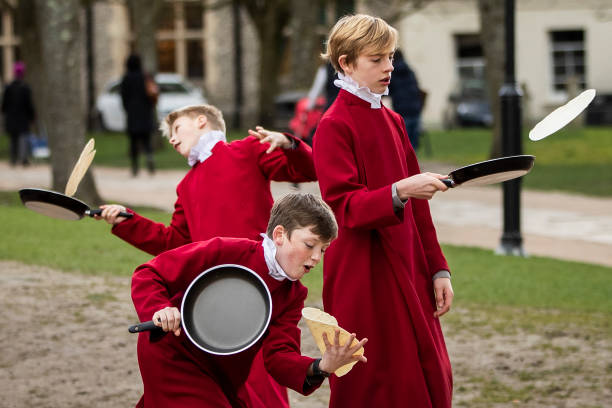
Choristers from Winchester Cathedral in the annual Shrove Tuesday Pancake d race in the Cathedral grounds with money raised going to local charities. (Photo by Dan Kitwood/Getty Images)
Love is Patient, Love is Kind featuring Lucy Stimpson-Maynard from the album “Love is the Way” recorded and produced by John Hodgkinson
Yesterday when Ash Wednesday and Valentine’s Day fell on the same day was the first time since 1923 and 1934.
What are the histories of these two occasions and what about the day before “Shrove Tuesday” or “Pancake Day?”
The expression Shrove Tuesday comes from the word shrive, meaning “absolve“. It is the day in February or March immediately preceding Ash Wednesday” which is the first day of Lent.
Shrove Tuesday is celebrated in some countries by consuming pancakes. In others, especially those where it is called Mardi Gras it is a carnival day. Pancakes are associated with the day preceding Lent, because they are a way to use up rich foods such as eggs, milk, and sugar, before the fasting season of the 40 days of Lent. The liturgical fasting emphasizes eating simpler food, and refraining from food that would give undue pleasure: in many cultures, this means no meat, dairy products, or eggs.
Ash Wednesday derives its name from the placing of repentance ashes on the foreheads of participants to utter the words “Repent, and believe in the Gospel” or “Remember that you are dust, and to dust you shall return”. The ashes may be prepared by burning palm leaves from the previous year’s Palm Sunday celebrations. Because it is the first day of Lent, many Christians, on Ash Wednesday often begin abstaining from a luxury that they will not partake of until Easter Sunday arrives.
There are a number of traditions associated with Valentine’s Day. The devotional “Every Day With Jesus” (now available as a free app) states:
The tradition of sending Valentine’s cards to loved ones probably comes from St Valentine of Rome, who defied the emperor who had forbidden soldiers to marry. Valentine would marry soldiers in secret. When discovered, he was sentenced to death and his prayer is believed to have restored the sight of the jailer’s daughter. His final letter to her on 14th February was signed “your valentine” and the tradition of card giving developed in the 18th century.
Next week more on the Arden Theatre (Titchfield Festival Theatre) v Fareham Borough Council saga.
Quote of the week

